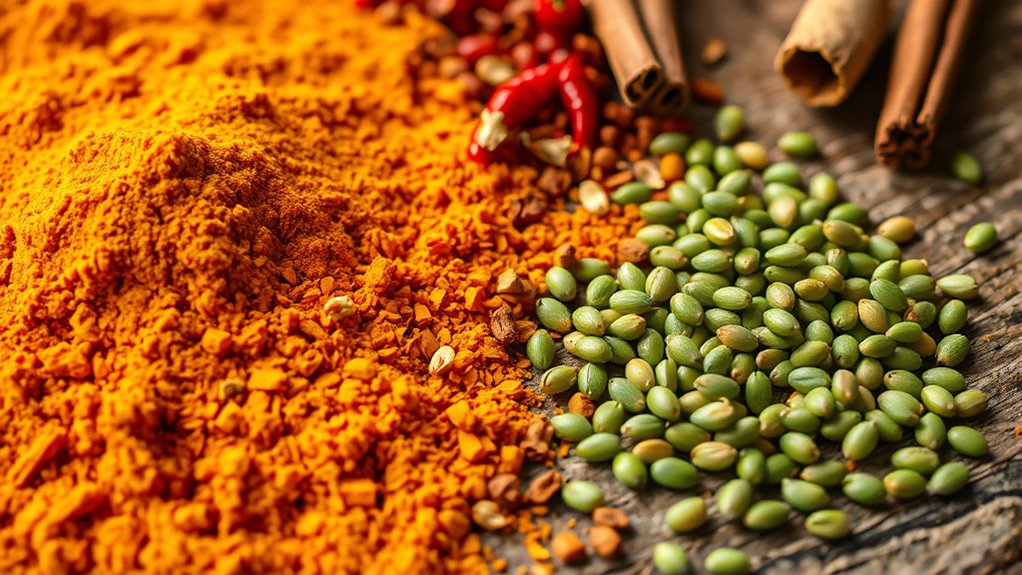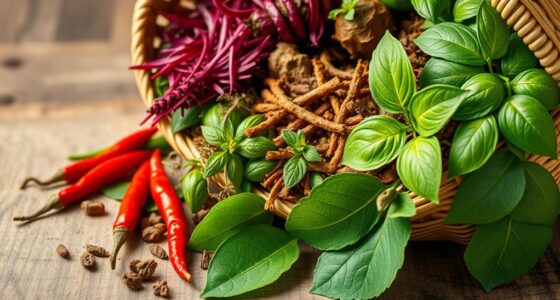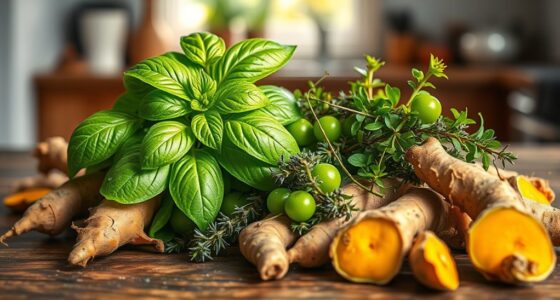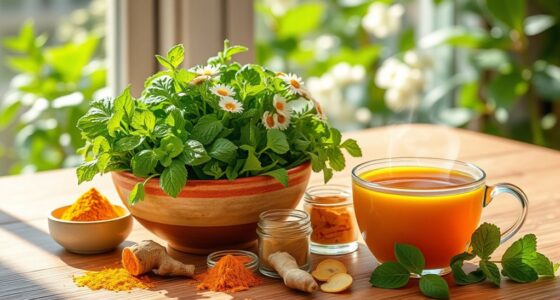To fight inflammation with food, incorporate powerful spices like turmeric, which contains curcumin that reduces inflammation and supports joint health. Ginger is also effective at lessening pain and swelling, while herbs like cinnamon, oregano, and rosemary add flavor and fight inflammation. Using fresh herbs and organizing your spice rack makes it easy to include these ingredients regularly. Keep exploring how these natural remedies can enhance your health and keep inflammation at bay.
Key Takeaways
- Incorporate turmeric, rich in anti-inflammatory curcumin, into your meals with black pepper to enhance absorption.
- Use fresh ginger in teas, stir-fries, and baked goods for potent anti-inflammatory benefits.
- Add herbs like oregano, rosemary, and cinnamon to dishes to boost their inflammation-fighting properties.
- Regularly consuming these spices and herbs supports joint health, immune function, and reduces chronic inflammation.
- Organize your spice collection and kitchen zones to encourage consistent use and maximize health benefits.
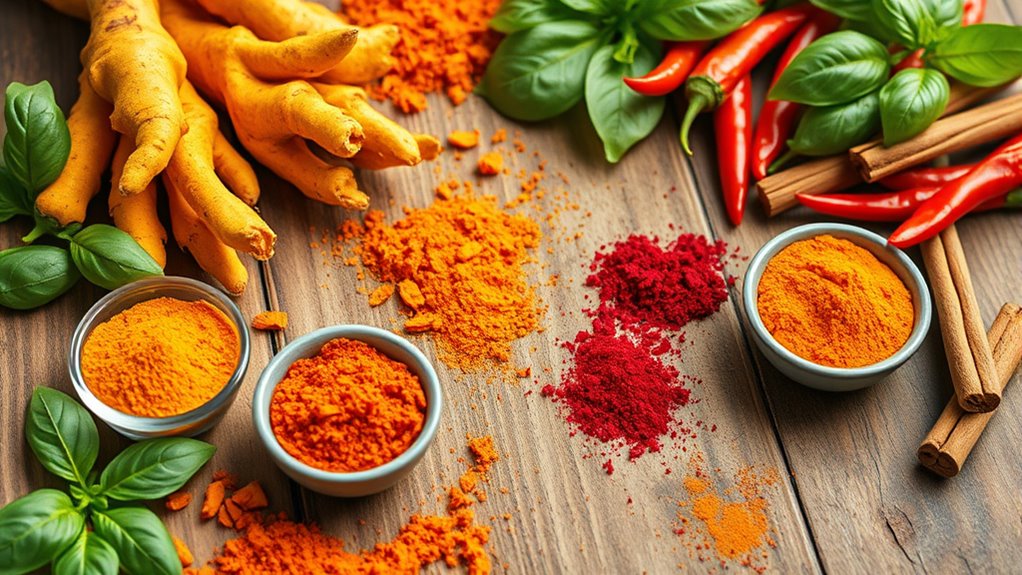
Chronic inflammation is linked to many health issues, but the good news is that what you eat can help combat it. One of the most powerful natural anti-inflammatory agents is turmeric. This vibrant yellow spice contains curcumin, a compound renowned for its ability to reduce inflammation at a cellular level. Incorporating turmeric into your meals can be simple—add it to soups, stews, smoothies, or even teas. To enhance absorption, pair it with black pepper, which contains piperine, a compound that markedly boosts curcumin’s bioavailability. The benefits of turmeric go beyond just fighting inflammation; it also supports joint health, boosts immune function, and may even improve mood. Regularly consuming turmeric can be a game-changer for managing chronic inflammatory conditions. Utilizing vertical storage solutions and organized spice racks can make it easier to keep your anti-inflammatory herbs and spices accessible and fresh, encouraging consistent use.
Alongside turmeric, many anti-inflammatory herbs offer similar benefits. Ginger, for example, is widely recognized for its potent anti-inflammatory properties. You can grate fresh ginger into your tea, stir-fry, or smoothies, or use dried ginger powder in baking. Like turmeric, ginger helps reduce pain and swelling caused by inflammation. Other herbs like cinnamon, oregano, and rosemary also contain compounds that help combat inflammation and support overall health. Incorporating a variety of these herbs into your daily diet ensures you’re not only enjoying diverse flavors but also maximizing their health benefits. These herbs can be added to salads, marinades, or used as garnishes, making it easy to include them in your routine. Creating designated zones in your kitchen for herbs and spices can streamline meal prep and promote regular use of these health-boosting ingredients.
When it comes to fighting inflammation, consistency is key. Using these herbs and spices regularly can help keep inflammation in check and prevent it from spiraling into chronic issues. Beyond their medicinal properties, these ingredients can make your meals more flavorful and satisfying. Keep in mind that whole, fresh herbs often contain higher concentrations of beneficial compounds than dried versions, so whenever possible, choose fresh. Also, combining these herbs with a balanced diet rich in fruits, vegetables, whole grains, and healthy fats will amplify their anti-inflammatory effects. Regular assessment of your pantry and kitchen organization can help you stay on track with incorporating these beneficial spices into your daily routine.
Frequently Asked Questions
Can Spices Completely Eliminate Chronic Inflammation?
Spices can’t completely eliminate chronic inflammation, but their potency can considerably reduce it. You should incorporate anti-inflammatory spices like turmeric and ginger into your diet through smart culinary pairings. While they offer health benefits, they work best alongside a balanced lifestyle. Don’t rely solely on spices—combine them with other healthy habits for the most effective approach. Remember, moderation and consistency make a real difference in managing inflammation.
Are There Any Side Effects From Consuming Anti-Inflammatory Spices?
Certain spices can be potent herbal remedies, but you should be aware of possible side effects. While many find relief, some may experience spice allergies or digestive discomfort. Always start small and observe your body’s response. If you have allergies or sensitivities, consult with a healthcare professional. Remember, moderation matters, and paying attention to your body’s signals helps prevent potential problems from anti-inflammatory spices.
How Much Spice Should I Eat Daily for Health Benefits?
You wonder about spice dosage for daily intake to get health benefits. Generally, a teaspoon of turmeric or cinnamon daily is effective without overdoing it. For spices like ginger, about 1-2 grams per day works well. Remember, moderation is key to avoid side effects. Start with small amounts, and if you notice any discomfort, cut back. Consistent, moderate spice consumption can boost your health safely.
Do Spices Interact With Common Medications?
You wonder if spices interact with common medications. It’s important to consider spice safety and potential drug interactions, as some spices can affect how medications work. For example, turmeric may thin blood, and cinnamon could impact blood sugar levels. Always check with your healthcare provider before adding new spices to your diet, especially if you’re on medication, to avoid unintended drug interactions and ensure safe spice consumption.
Can Children Safely Consume Inflammation-Fighting Spices?
You wonder if children can safely consume inflammation-fighting spices. It’s important to prioritize child safety, so consult with a healthcare professional before introducing new spices. Be aware of potential spice allergies, which can cause adverse reactions. Start with small amounts, observe for any allergic responses or sensitivities, and avoid spices if your child has known allergies. Always confirm spices are age-appropriate and used in moderation to keep your child safe.
Conclusion
By embracing these flavorful spices, you’re gently guiding your body toward harmony and comfort. Think of each meal as a small act of self-care, nurturing your well-being with every bite. Incorporating these healing herbs isn’t just about taste—it’s a subtle, loving way to support your health journey. So, savor each dish, knowing you’re making gentle choices that could brighten your days and soothe your body from within.

